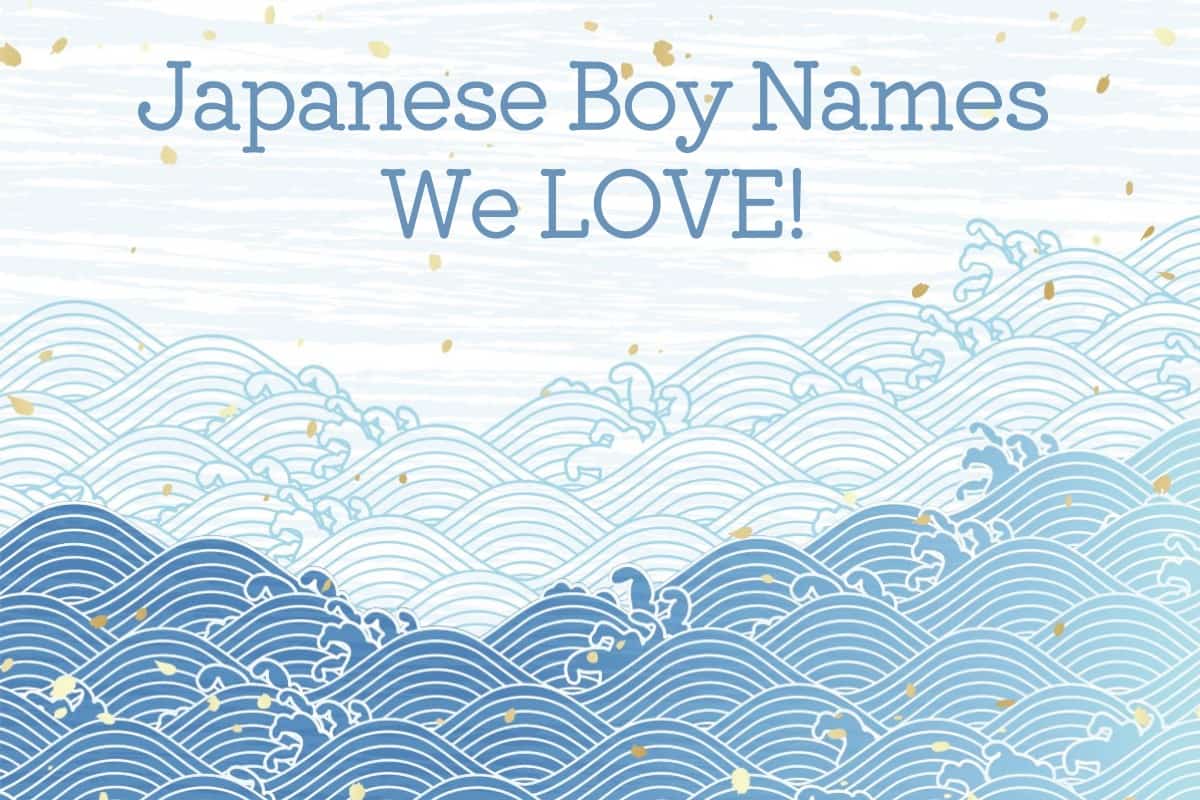When it comes to selecting a meaningful baby name for your little boy, you may be looking for a name that has an international feel. Here is a list of 25 Japanese baby names for boys that can help inspire your selections. Find out what each name means, how to pronounce it and more. Take a look!
RELATED: Japanese Girl Names We LOVE!
- Akihiro Akihiro is a boy’s name of Japanese origin. This name can mean “clear and wide” or “flying big” depending on the kanji used. It can also mean “bright”, “boy”, or “autumn”. It can even be translated to “bright prince.”
- Akira Akira is a gender-neutral name in Japanese, but it is most used for boys and is a variation of the name Kira. There are many ways in which Akira can be written with kanji. The most popular combination is of the characters for “sun” and “moon”, which means “the light coming from the sun”. It can also be translated as “intelligent”, “bright”, “truth”, or “wisdom”. Famous Akiras include award-winning Japanese filmmaker Akira Kurosawa.
- Akiyoshi Akiyoshi is a Japanese baby name primarily used for boys. It can mean “clear”, “bright”, or “justice” depending on the kanji used. The kanji for “autumn” and “good luck” can also be used to create the name Akiyoshi.
- Daichi Daichi (pronounced DIE-chee) is a Japanese boy’s name that can mean “large/great”, “land/earth”, or “wisdom/intelligent”. “Dai” means “impressive or grand” while “chi” is an affectionate word for “son” in the Japanese language. Therefore, it can also be interpreted as “grand first son”.
- Daisuke Daisuke (DIE-soo-keh) is a Japanese baby name for boys. Although it has many kanji combinations, it typically breaks down as “dai” meaning “big/great” and “suke” meaning “help”. Putting it together, the name can mean “big help”.
- Eiji Eiji is a Japanese baby name used for boys. “Ei” can mean “crystal” or “sparkle of jewelry”. “Ji” means “scholar”, “gentleman”, or “samurai”. The name Eiji can mean “to heal”, “to succeed”, “excellent”, or “peace” depending on the kanji used.
- Fumihiro Fumihiro is a Japanese boy’s name that is pronounced FUH-mi-hi-ro. It can mean “wide sentence” and is taken from the words “fumi” (“sentence” or “writing”) and “hiro” (“large” or “wide”). It can mean “history”, “writings”, or “extensive”.
- Haruto Haruto is a popular boys’ name in Japan that can be written in eight different kanji combinations. It can be translated to mean “fly”, “sunlight”, “sun”, or “distant”. It has been popularized with characters from anime and manga like Witch Hunter Robin and the role-playing game Suikoden IV.
- Hideaki Hideaki is a Japanese boy’s name that can be translated to mean “the light which comes from the sun”, “wisdom”, “bright”, “truth”, “intelligent”, or “moonlight and sunlight.” It can also mean “excellent”, “bright”, and “beauty”.
- Hikaru Hikaru can be used for boys or girls, but in Japan, it is more prevalently used for boys. It can mean “light” or “radiance”. It is the name of a popular character (Hikaru Sulu) from Star Trek.
- Itsuki Itsuki is mainly used as a baby boy name in Japan, although it also gets used as a surname. It can be written with different kanji, giving it various meanings: “servant of God (Shinto)”, “fiber moon”, “tree”, and “that one moon”. As a surname, it can mean “five trees”.
- Jiro Jiro is a Japanese boy’s name meaning “second one”. However, it is a commonly used name that gets applied to boys who are not the second son.
- Katsumi Katsumi can be used for either boys or girls but is more commonly used for Japanese baby boys. As a boy’s name, it can mean “winning beauty”, “hope triumphs”, “snake triumphs”, “ocean triumphs”, “to triumph over”, “kindness triumphs”, “you triumph”, “heart triumphs”, “progress triumphs”, or “beautiful arrowroot”.
- Kazuo Kazuo is a Japanese boy name that has multiple meanings: “first son”, “harmonious man”, and “husband of harmony”. It is not popular but has been used for character names, such as Kazuo Kiriyama in the manga and film Battle Royale.
- Kuro Kuro is primarily a masculine name in Japan. It can mean “ninth son” or “expert”. It also means “black” in Japanese.
- Makoto Makoto is gender-neutral but is more commonly used for males. It can mean “truth” or “sincerity”.
- Minoru Traditionally used for males, this Japanese name translates to “fruit” or “truth” depending on the kanji used.
- Naoki Often used for males in Japan, Naoki (NAH-oh-kee) is a name that means “straight” or “honest”.
- Nobu Nobu is a masculine name in Japanese that can mean “trust”, “stretched”, or “joy”. It can also be a nickname for longer names like Masanobu (which can also mean “trust”). Celebrities with this name include Chef Nobu Matsuhisa.
- Ryuhei Ryuhei (REE-you-hey) is a Japanese boy’s name takes on a few different meanings: “dragon”, “peaceful”, and “noble”.
- Seiji Predominantly used for Japanese males, Seiji (SAY-e-jee) means “heal”, “correct”, or “peace”.
- Takashi Takashi is a masculine Japanese name that translates to “ambition”, “dutiful”, or “prosper”. It can also mean “filial piety”.
- Toru Occasionally used for females, Toru is a predominantly masculine Japanese name. It can mean “clear” or “persistent”.
- Yoshiki Popularized by X-Japan’s drummer and composer Yoshiki, this name can mean “glory” or “honor”. It can be used for females but is more common among males.
- Zentaro An uncommon masculine name in Japan is Zentaro. It translates to “just firstborn son”.
The image featured at the top of this post is ©umiberry/Shutterstock.com
